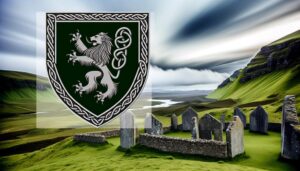Brendan Name Meaning and Origin
The name Brendan originates from the ancient Gaelic name Bréanainn, which means 'prince' or 'king' derived from the Old Irish word 'bréan.' It is linked to the Proto-Celtic *bronn and possibly the Old Welsh word 'breenhin' signifying a 'sovereign.' A prominent bearing of this name is Saint Brendan of Clonfert, a 6th-century Irish monk known for his legendary Atlantic voyage. Brendan holds a deep cultural significance in Irish and Welsh traditions, embodying themes of exploration and nobility.
The historical and etymological journey of Brendan reveals a name rich in heritage and tradition, promising intriguing discoveries ahead.

Key Takeaways
- Brendan derives from the Old Irish name Bréanainn, meaning 'prince' or 'king.'
- The name is associated with Saint Brendan, a 6th-century Irish monk and explorer.
- Brendan symbolizes themes of exploration, adventure, and nobility.
- It remains popular in Ireland and the United States for its classic appeal.
- The name reflects deep cultural and historical significance in Irish and Welsh traditions.
Historical Background
The name Brendan originates from the ancient Gaelic name Bréanainn, which itself is derived from the Old Irish word 'bréan,' meaning 'prince' or 'king.' This name holds significant historical weight, particularly in Ireland, where it has been borne by several notable figures.
Among them is Saint Brendan of Clonfert, a 6th-century Irish monk renowned for his legendary voyage across the Atlantic, often referred to as Brendan the Navigator. The historical prominence of Saint Brendan contributed to the name's widespread use, making it a staple in Irish nomenclature.
Over centuries, the name Brendan has transcended its Gaelic roots, becoming popular in various cultures while retaining its noble connotations and historical resonance, reflecting its enduring legacy.
Etymology
Frequently analyzed through historical and linguistic lenses, the etymology of the name Brendan reveals its deep roots in the Old Irish language. Derived from the Old Irish name Bréanainn, which itself originates from the Latinized Brendanus, the name is thought to be linked to the Proto-Celtic *bronn, meaning “prince” or “chieftain. ” This connection underscores the name’s longstanding association with nobility and leadership. When considering the Bryan name meaning, it is clear that the etymology of Brendan also reflects its significance in terms of leadership and power. This historical and linguistic analysis sheds light on the rich cultural and symbolic importance of the name, demonstrating its enduring relevance across different time periods and societies. In modern contexts, the name Brendan continues to evoke notions of strength, authority, and prestige.
Additionally, some linguistic scholars suggest that the name may also be related to the Old Welsh word breenhin, which similarly translates to “king” or “sovereign.” Through this etymological exploration, it becomes evident that Brendan is not merely a name but a reflection of historical titles and societal roles within early Celtic cultures.
Cultural Significance
In various cultural contexts, the name Brendan has been borne by notable historical figures, particularly within Irish and Welsh traditions, thereby solidifying its enduring legacy. The name's significance is deeply rooted in the following cultural dimensions:
- Religious Heritage: Saint Brendan of Clonfert, an Irish monastic saint, is famed for his legendary voyage, a narrative that has become a cornerstone of Christian lore.
- Literary Influence: The name appears in various literary works, reflecting its entrenched presence in folklore and storytelling, particularly in Celtic literature.
- Cultural Symbolism: Brendan embodies themes of exploration and adventure, resonating with the spirit of discovery and the human quest for new horizons.
These elements collectively underscore the name Brendan's profound cultural resonance and historical importance.
Famous Namesakes
Prominent figures named Brendan have left significant marks in various fields, from sports and entertainment to literature and academia.
In sports, Brendan Shanahan, a revered NHL player, exemplifies excellence with his multifaceted career as both a player and executive.
In the domain of entertainment, Brendan Fraser has garnered acclaim for his versatile acting roles, notably in 'The Mummy' series.
Literature boasts Brendan Behan, an influential Irish writer whose works encapsulate the socio-political landscape of mid-20th century Ireland.
Academia features Brendan O'Leary, a distinguished political scientist whose research profoundly impacts political theory and conflict resolution.
These Brendans illustrate the name's versatility and the remarkable contributions of its bearers across diverse professional spectra.
Popularity Over Time
The name Brendan, illustrated through its notable bearers, has experienced fluctuating popularity over the decades, reflecting broader cultural and societal trends. Historically, the name saw a surge in use during the mid-20th century, particularly in English-speaking countries. This can be attributed to the influence of prominent figures and cultural shifts.
- 1950s-1960s: Brendan gained traction, partly due to increased immigration from Ireland where the name originated.
- 1980s-1990s: The name peaked in popularity, coinciding with a trend towards traditional yet approachable names.
- 2000s-Present: Usage has stabilized, with the name maintaining a steady presence, albeit less prominently than in previous decades.
This temporal analysis underscores Brendan's dynamic journey through the annals of naming conventions.
Variations and Nicknames
Brendan exhibits a range of variations and nicknames that reflect its rich linguistic and cultural heritage. Derived from the Old Irish name Bréanainn, it has evolved across different languages and regions. Variations include the Irish Breandán, the Scottish Gaelic Breandan, and the anglicized Brendan. Each variant retains the essence of the original while adapting to phonetic and orthographic norms of its linguistic context.
Common nicknames such as Bren, Brendy, and Dan offer more informal, affectionate alternatives. This lexical diversity underscores the name's adaptability and enduring appeal. The multiplicity of forms and diminutives highlights Brendan's integration into various cultural milieus, showcasing its historical journey from ancient Ireland to modern global usage.
Saint Brendan the Navigator
Renowned for his legendary voyages, Saint Brendan the Navigator was a 6th-century Irish monk whose exploratory feats have been immortalized in medieval literature. His most famous journey, the 'Navigatio Sancti Brendani,' details his search for the fabled Isle of the Blessed. This account captures the imagination with its blend of Christian allegory and seafaring adventure, underpinning Brendan's reputation as a pioneering navigator.
Key aspects of Saint Brendan's life include:
- Monastic Life: He founded several monasteries, especially Clonfert, which became a prominent center of learning.
- Voyages: His maritime expeditions are said to have reached as far as North America, centuries before Viking exploration.
- Legacy: Brendan's tales have influenced both religious and secular narratives, ensuring his enduring legacy.
Literary References
The name Brendan has been immortalized in various literary contexts, spanning from ancient mythology to contemporary fiction. Characters named Brendan appear in classic tales, symbolizing heroic and adventurous qualities, while modern literature often portrays Brendans as complex, multidimensional figures.
This section will explore notable instances of Brendan in literature, examining both their historical significance and evolving representation.
Famous Brendan Characters
Exploring the literary landscape, one finds that characters named Brendan frequently embody themes of heroism and introspection, contributing richly to their respective narratives. These characters often reflect the name's historical and etymological roots, stemming from the Old Irish 'Bréanainn,' meaning 'prince' or 'king.'
- Brendan in 'The Secret of Kells': This animated film reimagines Brendan as a young monk whose quest to illuminate a sacred manuscript underscores themes of courage and artistic dedication.
- Brendan in 'The Brendan Voyage': Tim Severin's narrative explores the legendary voyage of Saint Brendan, blending historical adventure with maritime mythology.
- Brendan in 'Hannibal Rising': Thomas Harris introduces Brendan as a character whose tragic backstory serves to deepen the psychological complexity of the novel.
These literary Brendans exemplify valor, exploration, and personal growth.
Brendan in Mythology
Saint Brendan the Navigator, a pivotal figure in Celtic mythology, is celebrated for his legendary sea voyages and is often depicted as a symbol of exploration and perseverance in medieval literature. His most renowned narrative, *Navigatio Sancti Brendani Abbatis* (Voyage of Saint Brendan the Abbot), details his epic quest for the fabled 'Isle of the Blessed.'
Written between the 8th and 10th centuries, this text melds Christian allegory with adventurous exploits, reflecting the medieval European fascination with uncharted territories. Brendan's voyages, infused with mystical elements and moral undertones, underscore themes of faith and resilience.
His literary portrayal signifies a cultural archetype: the courageous seeker of divine truth amidst the vast and unpredictable ocean, encapsulating the era's spirit of exploration.
Modern Literary Brendans
In contemporary literature, the name Brendan often invokes a sense of adventure and resilience, mirroring its mythological roots. Authors frequently imbue characters named Brendan with qualities of bravery and determination, reflecting the name's historical associations. This trend can be seen across various genres, from fantasy to modern fiction.
- Brendan in 'The Secret of Kells': This animated film, set in medieval Ireland, features a young monk named Brendan who sets off on a perilous journey to complete a legendary manuscript.
- Brendan in 'The Sea of Trolls': Nancy Farmer's novel presents Brendan as a bold and resourceful protagonist steering through a world of Norse mythology.
- Brendan in 'Brendan' by Frederick Buechner: This novel explores the life of Saint Brendan, blending historical facts with imaginative storytelling.
Each literary Brendan encapsulates a spirit of exploration and fortitude, aligning with the name's enduring legacy.
Modern Usage
Today, the name Brendan continues to be favored among parents for its classic yet contemporary appeal. Deriving from the Old Irish name Bréanainn, which means 'prince' or 'king,' Brendan retains a sense of nobility and timelessness.
In modern naming trends, Brendan strikes a balance between uniqueness and familiarity, avoiding the overuse seen in more common names. This lexical choice appeals to those seeking a name that conveys both historical depth and modern charm.
Additionally, the name has maintained steady popularity in English-speaking countries, particularly in Ireland and the United States. Its versatility is further enhanced by its ease of pronunciation and the affectionate diminutive 'Bren,' making it both elegant and approachable for contemporary usage.
Conclusion
The name Brendan, rooted in ancient Celtic tradition, embodies a rich tapestry of historical, cultural, and etymological significance. From its origins in Old Irish to its association with Saint Brendan the Navigator, the name has traversed centuries, bearing witness to literary and cultural milestones.
Indeed, the name's enduring popularity and variations underscore its adaptability. Consequently, the legacy of Brendan endures, a confirmation of the resilience and timeless appeal of linguistic heritage.






